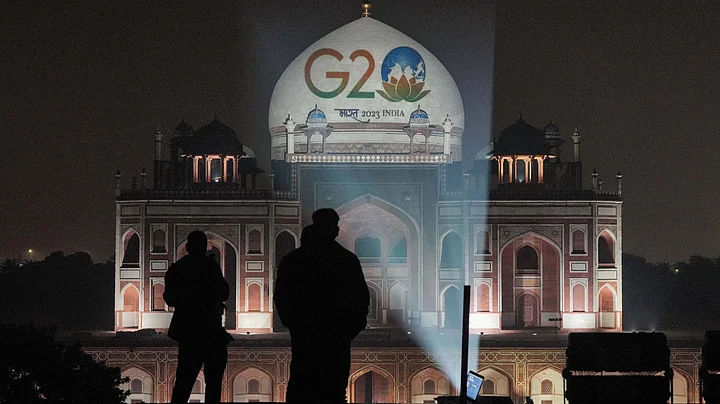It was going to be all about Russia. And surely it turned out to be so—no joint communique after the G20 foreign ministers' meeting. Prime Minister Narendra Modi anticipated it when he urged foreign ministers of G20 nations to look for common ground on global issues. Sticking to India's consistent stand on the year-long conflict between Russia and Ukraine, PM Modi made an attempt to set the tone of the foreign ministers' meeting that came on the heels of the G20 meeting of finance ministers. The Bangalore meeting also concluded without a joing communique.
India's G20 presidency involves making herculean efforts to reach a consensus in a scenario when the world appears deeply divided. The first blow came in the form of a "chair's summary and outcome document" instead of a joint communique after the finance minister's meeting. G20 finance ministers could not reach a consensus to condemn Russia for the war and its aftermath.
From Bali to New Delhi, Is G20 Fraying?
The pressure on External Affairs Minister S Jaishankar was, therefore, enormous.
Addressing the press after the meeting, Jaishankar shared that two paragraphs of the Chair's Summary could not be agreed upon by all the G20 members. In a rather poetic manner, Jaishankar said, "If we had had a perfect meeting of minds, we would have had a joint communique. But there were divergences and these concerned the Ukraine conflict".
This failure to come up with a joint communique was along the expected lines, yet there was hope.
Just four months ago, in November 2022, G20 leaders issued a joint declaration at the end of the Bali summit. The following excerpt clearly suggests that there were divergences on the Ukraine issue and sanction on Russia.
"Most members strongly condemned the war in Ukraine and stressed it is causing immense human suffering and exacerbating existing fragilities in the global economy – constraining growth, increasing inflation, disrupting supply chains, heightening energy and food insecurity, and elevating financial stability risks. There were other views and different assessments of the situation and sanctions. Recognizing that the G20 is not the forum to resolve security issues, we acknowledge that security issues can have significant consequences for the global economy."
The Bali declaration was inward looking in acknowledging that G20 was not a forum to resolve security issues.
Is It About India's Stand On Russia-Ukraine?
What, then, went wrong in New Delhi?
Going by Russia's Foreign Minister Sergey Lavrov's statement to the press right after the meeting, "the attitude of the West" was responsible for the lack of a consensus.
Former Union Minister, Dr Shashi Tharoor, however, said in the context of G20 finance ministers' meeting that India's reluctance to use the word "war" blocked the joint communique.
The reality, however, may be a little more complex than that. Or, it may be seen as the same old story of 'neighbour's envy'.
While constantly urging both President Vladimir Putin and President Volodymyr Zelenskyy, India refuses to blame Russia, backing the latter in multilateral groupings and the UN, and has increased its Russian oil import volumes despite the sanctions. While some say that Indian diplomacy has been at its best while dealing with this global crisis, others critique the Indian position as a cop-out.
Is It About India's Emergence As A Leader From Global South?
New Delhi has emerged as a conscientious objecter to the Russia-Ukraine conflict and may be well-situated to initiate a peace process. Among all the countries that still share good diplomatic rapport with Russia—Belarus, Iran, North Korea, Syria, China et al—India is uniquely positioned as a conduit between the West and Vladimir Putin.
The West acknowledges that, too. After all, India's dramatic increase in Russian oil imports has not inspired any adverse action from the West. Now, this emrgence of India as a key player in the resolution of this global affair may not be amenable to China. With its ongoing boundary dispute with New Delhi and the historical Tibet question, a successful G20 summit under India's presidency is not something Beijing will be excited about.
It is to be remembered that China has been blocking India's moves in UN Security Council to officially designate Pakistan-based outfits and individuals as terrorists. These include Lashkar-e-Taiba deputy chief Abdul Rehman Makki and Jaish-e-Mohammad chief Masood Azhar. India's bid to attain a permanent seat at the UNSC has also been getting blocked by China.
On the other hand, India recently helped China block a debate on human rights abuses in Xinjiang at the UN in October 2022.
China's Problematic Actions In Multilateral Platforms
Under China's shadow, therefore, even a consensus on terrorism achieved at G20, as shared by Foreign Minister Jaishankar needs to be seen as an achievement.
After the G20 meeting, Jaishankar met China's foreign minister Qin Gang, a close aide of Xi Jinping. The meet, as per Jaishankar's tweet, focused on “addressing current challenges to the bilateral relationship, especially peace and tranquillity in the border areas” as well as the G20 agenda.
What also needs to be kept in mind is that Russia and China also held a bilateral meeting on th esidelines of the foreign ministers' meeting and issued a strongly worded statement.
“A unanimous rejection was expressed of attempts to interfere in the internal affairs of other countries, to impose unilateral approaches through blackmail and threats, and to oppose the democratisation of international relations."
(At The Quint, we question everything. Play an active role in shaping our journalism by becoming a member today.)
